
 |
The Safety of Objects (2003) Directed by Rose Troche Cast: Glenn Close, Dermot Mulroney, Patricia Clarkson, Mary Kay Place, Jessica Campbell, Moira Kelly, Timothy Olyphant, Kristen Stewart, Joshua Jackson, Alex House, Robert Klein, Charlotte Arnold, Aaron Ashmore, C. David Johnson, Haylee Wanstall, Stephanie Mills, Dwayne Hill 2003 – 121 minutes Rated: Reviewed by Dustin Putman, March 8, 2003. 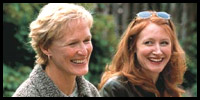 The story of four dysfunctional families living in close proximity within the same suburban neighborhood, "The Safety of Object" takes a topic that isn't particularly new (think "American Beauty") and the unforced form of a Robert Altman picture (think "Short Cuts") to seamlessly interweave its complicated characters and their even more complicated lives into a wholly original and vibrant tapestry. The result is genuinely hypnotic, a passionate and deeply poignant motion picture that, no matter where you live, may remind you of your own past behaviors and actions. For me, an innocent, late-night game of Marco Polo in a swimming pool between three children was like peering through a kaleidoscope at my own childhood.
The story of four dysfunctional families living in close proximity within the same suburban neighborhood, "The Safety of Object" takes a topic that isn't particularly new (think "American Beauty") and the unforced form of a Robert Altman picture (think "Short Cuts") to seamlessly interweave its complicated characters and their even more complicated lives into a wholly original and vibrant tapestry. The result is genuinely hypnotic, a passionate and deeply poignant motion picture that, no matter where you live, may remind you of your own past behaviors and actions. For me, an innocent, late-night game of Marco Polo in a swimming pool between three children was like peering through a kaleidoscope at my own childhood.
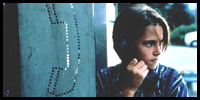 For director Rose Troche, who has had varying success in the past with her two previous pictures, 1994's "Go Fish" and 1999's "Bedrooms and Hallways," "The Safety of Objects" marks a major growth for her as a filmmaker. In beautifully adapting and conjoining a handful of short stories from author A.M. Homes' same-titled novel, Troche has gotten to the heart of the American Dream, or the eventual lack thereof, creating a sharply focused microcosm of familial life and the joys and hardships that go along with it.
For director Rose Troche, who has had varying success in the past with her two previous pictures, 1994's "Go Fish" and 1999's "Bedrooms and Hallways," "The Safety of Objects" marks a major growth for her as a filmmaker. In beautifully adapting and conjoining a handful of short stories from author A.M. Homes' same-titled novel, Troche has gotten to the heart of the American Dream, or the eventual lack thereof, creating a sharply focused microcosm of familial life and the joys and hardships that go along with it.
For the Gold's, life has been at a congested standstill for the last year, ever since teenage son Paul (Joshua Jackson) was involved in a near-fatal car accident. Now in a permanent coma, grieving mother Esther (Glenn Close) spends her days with Paul as he lies motionless in his bedroom, reading books and talking to him as if nothing has happened. In the process, Esther has unknowingly alienated her husband Howard (Robert Klein), while leaving her teenage daughter Julie (Jessica Campbell) questioning why her mother never showed as much affection toward her. Next door at the Jennings', divorced mother Annette (Patricia Clarkson) is trying to connect to her two daughters, the androgynous Sam (Kristen Stewart) and autistic Rayanne (Haylee Wanstall), while being painfully reminded every night of the love affair she once had with Paul (from her bedroom window, she can see him lying in his bed in a sleep that he will never wake up from).  Down the street, lawyer Jim Train (Dermot Mulroney) is betrayed at work and quits his job, keeping it a secret from wife Susan (Moira Kelly). At a crossroads in his life, Jim yearns to participate in something that will give his life meaning. Meanwhile, preteen son Jake (Alex House) has begun an unhealthy relationship with his younger sister's Barbie doll.
Down the street, lawyer Jim Train (Dermot Mulroney) is betrayed at work and quits his job, keeping it a secret from wife Susan (Moira Kelly). At a crossroads in his life, Jim yearns to participate in something that will give his life meaning. Meanwhile, preteen son Jake (Alex House) has begun an unhealthy relationship with his younger sister's Barbie doll.
Finally, at the Christianson's, unhappy mother Helen (Mary Kay Place) has begun to stress about aging, while contemplating cheating on her husband, Wayne (C. David Johnson). One of her potential suitors is hunky neighborhood gardener Randy (Timothy Olyphant), whose little brother was killed in the accident that left Paul a human vegetable. The visually stunning and symbolically sound opening credits, in which the four families are wheeled out of their houses one at a time in the form of wooden sculptures, only to be forced into a prison that the film's title creates in front of the homes. The introduction scenes, alive in a way few screen moments ever are, cleverly finds connections between the four families and then edits them together to show how physically close and psychologically distant they are to one another. It's a stunning five minutes any way you look at it.  "The Safety of Objects" is a startlingly assured and multilayered drama, unforgettably acted and written, with small moments that are just as meaningful as the bigger ones. The center of the story—Paul's accident and subsequent coma—affects each of the four families in one way or another, whether they realize it or not. The sequences with Paul are, in many ways, its most heartbreaking, the way he is wheeled to the dinner table to sit with the rest of his family, or the way Esther still knocks on his bedroom door before entering, as if he has a say in the matter concerning whether she can come in or not. At another point, Julie and her two friends come in Paul's bedroom to check on him. Both of them used to have a crush on Paul, and when one of them touches his face, she comments, "He's warm," as if she cannot process that someone in Paul's condition could still technically be alive.
"The Safety of Objects" is a startlingly assured and multilayered drama, unforgettably acted and written, with small moments that are just as meaningful as the bigger ones. The center of the story—Paul's accident and subsequent coma—affects each of the four families in one way or another, whether they realize it or not. The sequences with Paul are, in many ways, its most heartbreaking, the way he is wheeled to the dinner table to sit with the rest of his family, or the way Esther still knocks on his bedroom door before entering, as if he has a say in the matter concerning whether she can come in or not. At another point, Julie and her two friends come in Paul's bedroom to check on him. Both of them used to have a crush on Paul, and when one of them touches his face, she comments, "He's warm," as if she cannot process that someone in Paul's condition could still technically be alive.
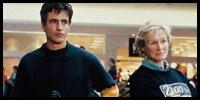 The other central event of the story is Esther's decision to enter a "Hands on a Hardbody" contest at the mall, in which the contestant who can stand around the truck touching it the longest wins it. Under a guilt trip from Julie, Esther wants to win the truck and give it to her daughter in a misguided attempt to make up for her parental neglect and undeniable favoritism. The now-out-of-work Jim is suddenly reinvigorated when he catches wind of Esther's valiant attempt, and decides that if he helps her to win it might be his savior. The contest brings hidden wounds to the surface for Esther and Julie, while Tim experiences a life-changing catharsis that comes right out of left field and stabs him squarely in the gut.
The other central event of the story is Esther's decision to enter a "Hands on a Hardbody" contest at the mall, in which the contestant who can stand around the truck touching it the longest wins it. Under a guilt trip from Julie, Esther wants to win the truck and give it to her daughter in a misguided attempt to make up for her parental neglect and undeniable favoritism. The now-out-of-work Jim is suddenly reinvigorated when he catches wind of Esther's valiant attempt, and decides that if he helps her to win it might be his savior. The contest brings hidden wounds to the surface for Esther and Julie, while Tim experiences a life-changing catharsis that comes right out of left field and stabs him squarely in the gut.
The entire ensemble cast is superlative, each one creating a distinct and three-dimensional individual out of sometimes sparse screen time. Giving the kind of emotionally naked and courageous performance that makes you wonder why she doesn't get more feature film work, Glenn Close (1999's "Cookie's Fortune") is stupendously effective as the conflicted Esther Gold. Jessica Campbell (1999's "Election") matches Close in terms of focus and complexity as daughter Julie, who wonders why Esther always seemed to prefer Paul over her. 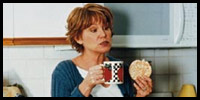 Patricia Clarkson (2002's "Far From Heaven") turns in another remarkable turn as Annette Jennings, who shares a common bond with Esther in Paul, but never got the chance to know her enough to connect to her. In turn, Esther has no idea what Annette meant to Paul before his accident. The rest of the cast is uniformly excellent, with special note going to Mary Kay Place (2002's "Sweet Home Alabama") and Dermot Mulroney (2002's "About Schmidt") as parents Helen Christianson and Jim Train; Timothy Olyphant, touching as confused family gardener Randy; and Kristen Stewart (2002's "Panic Room"), Joshua Jackson (2000's "The Skulls"), Alex House, and Charlotte Arnold as children Sam Jennings, Paul Gold, Jake Train, and Sally Christianson.
Patricia Clarkson (2002's "Far From Heaven") turns in another remarkable turn as Annette Jennings, who shares a common bond with Esther in Paul, but never got the chance to know her enough to connect to her. In turn, Esther has no idea what Annette meant to Paul before his accident. The rest of the cast is uniformly excellent, with special note going to Mary Kay Place (2002's "Sweet Home Alabama") and Dermot Mulroney (2002's "About Schmidt") as parents Helen Christianson and Jim Train; Timothy Olyphant, touching as confused family gardener Randy; and Kristen Stewart (2002's "Panic Room"), Joshua Jackson (2000's "The Skulls"), Alex House, and Charlotte Arnold as children Sam Jennings, Paul Gold, Jake Train, and Sally Christianson.
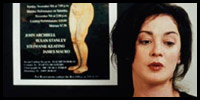 As the crucial final scenes unfold while a tricky moral decision is contemplated, the film becomes a veritable tearjerker, yet remains honest and believable, successfully earning every one of its heartrending moments. "The Safety of Objects," a thought-provoking title that comes from the notion that objects—unlike living creatures—do not have the capabilities to hurt us, is the first truly great motion picture of 2003. It is rare that a movie is released as honest, perceptive, enthralling, and emotionally rewarding as this one is. Seek it out.
As the crucial final scenes unfold while a tricky moral decision is contemplated, the film becomes a veritable tearjerker, yet remains honest and believable, successfully earning every one of its heartrending moments. "The Safety of Objects," a thought-provoking title that comes from the notion that objects—unlike living creatures—do not have the capabilities to hurt us, is the first truly great motion picture of 2003. It is rare that a movie is released as honest, perceptive, enthralling, and emotionally rewarding as this one is. Seek it out.
|
© 2003 by Dustin Putman |













